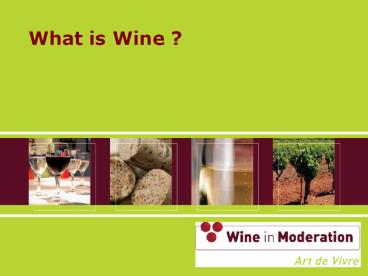What is Wine ? - PowerPoint PPT Presentation
Title: What is Wine ?
1
What is Wine ?
2
Principles
- The EU Wine Sector principles (I)
- Wine is part of our European lifestyle, culture
and heritage - The problem is not alcohol consumption as such,
but alcohol abuse and misuse! Wine consumed
responsibly in moderation is compatible with a
healthy lifestyle - Wine is indeed moderately and responsibly
consumed by a vast majority of individuals, but
we acknowledge it is misused by a minority - The consequences of alcohol consumption depend on
drinking patterns, which are strongly influenced
by cultural factors - The most effective way to prevent alcohol abuse
and misuse is to set up evidence-based education
programmes in the broader sense taking into
account the specific drinking patterns and
particularities of each region and collaborating
with the relevant authorities and stakeholders,
both at national and local level
3
Principles
- The EU Wine Sector Principles (II)
- Taking into account the various specific
national, cultural, situations, targeted regional
or local efforts should focus on - Positive approaches to encourage responsible
drinking patterns and moderate consumption as a
social norm among those adults who choose to
drink - Support the enforcement of existing national laws
and regulations adopted through a democratic
process with a regional approach to resolving
serious problems - To provide citizens with relevant and accurate
information by appropriate, effective and
proportionate means to allow them to make
responsible decisions - Education in the broadest sense of life-skills
to promote sensible drinking patterns and
cultural change in the approach to alcohol
beverages and to reduce alcohol related harm.
4
A natural productCenturies of passion, a
multitude of varieties
Soil
Wine making styles
Wine is a product obtained exclusively from the
total or partial alcoholic fermentation of fresh
grapes, whether or not crushed, or of grape
must. (EU Wine Regulations)
Each wine is unique
Geology
Weather
5
Culture of wine A heritage of cultivation,
appreciation and diversity
- The role of wine has evolved over time
- from an important to a cultural complement
source of nutrition to food and conviviality - Wine is usually associated with gastronomy,
history, local quality products and dignified
social settings - Must ensure that moderate consumption remains the
norm
6
Benefits of moderate wine consumption
Moderate wine drinkers live longer than those who
abstain or drink heavily
7
ART DE VIVRE EDUCATION
- Active education of industry and consumers who
appreciate wine to do it in moderation and
responsibly as part of a healthy lifestyle - Training for industry professionals from
winemakers to salespeople. - Balanced information on risks of misuse and
benefits of moderate consumption
8
Objective 1 A Common Moderation
Message Disseminating throughout the entire wine
sector a common message about moderation, using
targeted communication materials, including
brochures and presentations, for use with people
of all ages. Objective 2 Education Arts de
Vivre (Life-skills) Educating key actors and
consumers about responsible drinking, through
targeted education programmes, to encourage
cultural change and to make moderation
fashionable. Objective 3 Wine Communication
standards Promoting responsible commercial
communications, through the adoption of a common
code of conduct for commercial communication,
building on national self-regulatory codes.
Objective 4 The Wine Information
Council Sharing best practice across the EU, by
making all relevant scientific information
available, and by stimulating identification of
priority areas for additional independent
research on health, social and cultural aspects
of wine drinking in Europe.































